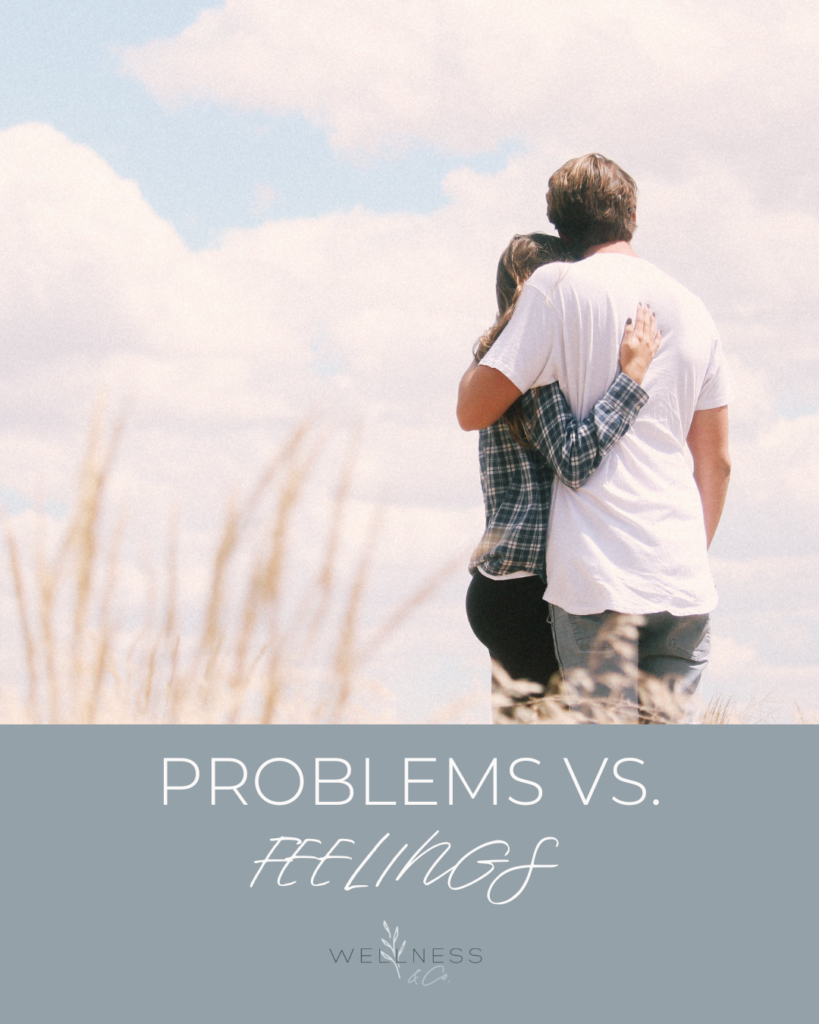Follow
Wellness & Co.
Hi, I'm Dr. K, Wellness & Co. is a growing therapy/coaching practice and educational hub for prospective clients based in Maryland and virtual clients all over the world!
Hi, I'm Dr. K
free guide
e -books
e -course
Problems vs. Feelings
October 30, 2023
By Rebecca Horch, BACYC, CPC
READING TIME: 4 MINUTES

Is it a problem to be solved or a feeling that needs support?
This is the question I’ve learned to ask myself when it comes to my kids, my friendships, my relationship, and my clients. The answer isn’t always as clear as you think it should be, and the impact of answering that question “wrong” can be huge.
Problems seek solutions
Feelings seek support
It’s so easy to mistake a feeling for a problem, especially when it comes to the people we love and care about.
Your partner is venting about a bad day at work…
You kid is telling you they had nobody to play with at recess…
Your friend is complaining about their financial stress…
These can all look like “problems” on the outside, and so we start approaching them with solutions. And then we find:
Your partner gets upset with you for not caring…
Your kid doesn’t take you up on any of your advice on how to make friends…
Your friend feels criticized and judged…
You’re left feeling confused, and maybe a little indignant. People are sharing their problems, and you are offering solutions. Why do they get upset, or continue to do the thing that is clearly not working for them?!
It’s because you are attempting to solve a problem instead of meeting a feeling. And when that happens, you might as well be speaking two completely different languages.
There is a good reason why some of us are more prone to prioritizing problem solving over emotional support. Maybe you were raised in a home where feelings were not met with curiosity and support yourself; maybe you criticize your past experiences when you didn’t solve a problem in your life in a way you wish you would have; maybe you genuinely want to help the people you care about, and it’s really difficult for you to see them hurting so you try to “fix” it for them. Whatever the reason is, it is important to remember that the impact of your actions are often more important than your intentions, no matter how genuine those intentions may be. And when it comes to emotional support, oftentimes we completely miss the mark.
This is a skill that takes practice with slowing down. Next time someone comes to you with what you deem as a problem that needs a solution, try to take a pause before jumping into “fix it” mode. Instead, start by asking some questions to get clarity on what they are looking for from you. Then, notice what it is like for you to simply support someone in their experience before helping them solve the problem. Is it difficult to do this? Does it come naturally? Do you want to resist the feeling or do you embrace it? This practice may just point you to something in yourself that needs your attention. It can be nearly impossible to sit with other people’s feelings when you cannot tolerate the depth of your own feelings. What someone cannot tolerate in themselves, they will have a very difficult time being with in someone else.
In the meantime, as you practice slowing down and getting curious, the next time this happens here are some helpful phrases and questions to use in order to get clarity on the best way you can show up for the people in your life:
- Wow, that sounds really hard. How did that make you feel?
- It sounds like you’re really overwhelmed. Is there something I can do to help?
- It sounds like you need to vent, I just want to check to make sure, did you need help brainstorming ideas of what to do, too?
- What is the best way to support you right now?
- You really had a rough day, that has got to feel very heavy.
- I’m so glad you’re telling me. I’m here to listen or to help, whatever you need.
Notice that in these responses there is an acknowledgement of the FEELING first, and then an offering for problem solving if they want to take it. There is low pressure and a recognition of the experience itself, not just “fixing” the problem.
This approach may feel new and a little awkward at first, and that’s ok. Try to remember that most of the time people just want a listening ear and some validation. And if you create the space for more than that, they are more likely to take you up on it if you meet the feeling first.
Good luck problem solver! You got this.
Rebecca strives to support others in building resilience, self-compassion, connected relationships and self-awareness. She loves to work with people who are ready for the hard work of inner growth and is passionate about helping others tap into their intuitive gifts and use them in this world.
Leave a Reply Cancel reply
CONTACT
Start Here
BLOG
OUR TEAM
SHOP
ABOUT
©2025 Wellness & Co. | All Rights Reserved | Design by EverMint Design Studio
BACK TO TOP
connect with us on instagram
